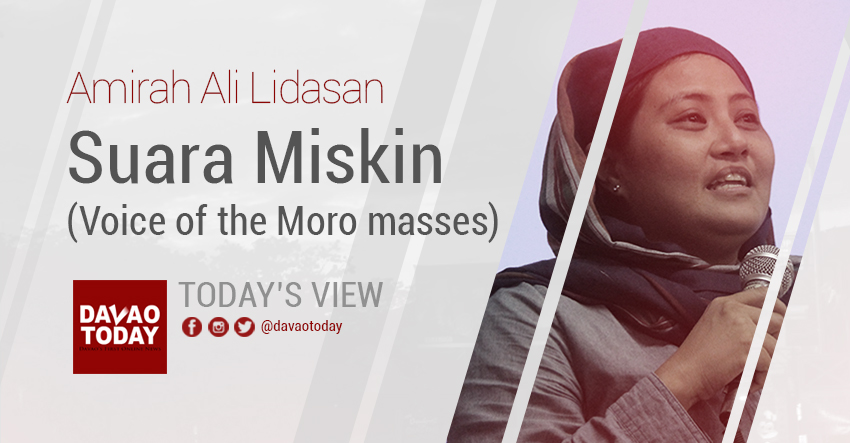
A friend and colleague jokingly asked if the Bangsamoro people are celebrating the August 15 victory of the Taliban over the US-trained Afghan National Defence Security Forces and the US-installed and backed Afghan puppet government.
Based on the social media posts and messages and the talks in the streets, I would say that fellow Bangsamoro are very careful of their opinions, lest they be accused of harboring terroristic ideas again.
Harboring terroristic ideals was an accusation hurled by President Rodrigo Duterte at the Meranaw people to justify the Philippine government’s military airstrikes in Marawi City and his declaration of Martial Law in Mindanao in May 2017.
Not to mention that the Muslim communities here in the Philippines have been perenially accused of harboring terrorists, and during the Operation Enduring Freedom was dubbed as the second front of the war on terror which led to the deployment of US soldiers in Mindanao for military exercises on a “rotational” basis.
But how can we celebrate, when we’ve seen what we have been warning the world about during our protests against the US-led global war on terror, the consequent US-led invasion of Afghanistan in 2001 and the continuing military occupation of Afghanistan? That this would only lead to un-peace and destruction of Afghanistan.
The International League of Peoples Struggle (ILPS), the network our group belongs to, has said that the fall of the US-installed and US-backed Ashraf Ghani regime not only exposed the defeat of US imperialism but also how unjust the US war and occupation was.
The US military invasion, occupation and intervention was unjust because the Afghan people bore the brunt of the military operations and encounters with the Taliban. There were 2.7 million Afghans who were forced to seek refuge in other countries while 4 million were internally displaced due to incessant military airstrikes in areas they believe were hideouts of the Taliban, Osama Bin Laden and the Al Qaeda network.
The US government created a condition for the Taliban to win the hearts and minds of the Afghan people. Decades of political and economic intervention by the US government in Afghanistan has pushed the Afghan people to see the Taliban as their liberators. ILPS chair emeritus Jose Maria Sison even said that in the absence of a “capable” revolutionary party, the Taliban group played a “progressive” role in fighting imperialism and the brutal puppet regime.
There were numerous reports of civilian casualties and human rights violations during the whole decade of US military intervention. According to the Cost of War Project by Brown University, 157,000 people died throughout the US occupation of Afghanistan and civilian casualties reached 47,245.
The project also reported that the number of civilians killed due to military airstrikes by US forces and its allies has increased to 330% since 2017.
The Human Rights Watch had a report about civilians bearing the brunt of night raids by CIA-backed Afghan Strike Forces from the years 2017 to mid-2019 due to “mistaken identity, poor intelligence or political rivalry.”
In her book Drones and Targeted Killing, law professor and former deputy secretary-general of the International Association of Democratic Lawyers Marjorie Cohn wrote that the US government has killed more civilians with the use of “targeted killings” – drone strikes, manned bombers and military raids.
A United Nations data cited by the International NGO, Save the Children, showed that at least 26,025 children were killed or maimed in the years 2005-2019 and that this was due to the attacks on schools by military airstrike of the US and Afghan forces and suicide attacks by the Taliban insurgents.
It is important that we be reminded of these reports because until now, no one from the proponents or architects of the US-led invasion and military occupation in Afghanistan were held accountable. No tribunals were held for war crimes against the people of Afghanistan.
I’ve been hearing from CNN the word “democracy” and the death of it due to the takeover of the Taliban in Afghanistan. Was the US-controlled Afghan government democratic? Was the US invasion and decades of intervention in Afghanistan democratic?
Years of occupation and installing puppet regimes also failed to bring the much-touted democracy, development and genuine peace in the country.
According to the Asian Development Bank, people who live below the national poverty line in Afghanistan reached 47.3% out of 39 million last year while the unemployment rate was at 11.7%.
According to the UN Office for the Coordination of Humanitarian Affairs 2020 Afghanistan Humanitarian Needs Overview, posted at the USAID website, 8.2 million people in Afghanistan are in need of emergency food and agricultural livelihoods assistance while 11 million Afghans are “acutely and severely” food insecure or lacked access to affordable and healthy food.
The continuing struggle against oppression
The news footage played over and over again in the US mainstream media of Afghans attempting to hold on to a US military plane as it took off from the Kabul airport does not only show the desperation of the Afghan people who figured in the US occupation and the puppet government to get out of Afghanistan and escape the Taliban’s reprisal.
To many, it only shows the true colors of the US government, that in times of crisis they are the first to get out of the country and leave all the mess behind. An opinion in the Wall Street Journal pointed out that the US government had no treaty obligation to protect the Afghan government from its enemies.
Imperialist powers should be reminded that the Afghan people have long fought wars of aggression from the British and Russian empires to the Soviet Union and the US-led invasion and occupation. The persistence of the Afghan people will once again be tested under the Taliban government.
The Taliban’s history of imposing an ultra-conservative and often puritanical interpretation of Islamic laws, especially with women and minorities, is forever embedded in the minds of the Afghan people and the world as abusive and oppressive.
However, we should be reminded that not all Muslims adhere to these strict views, as there are several Islamic thoughts and schools of interpretations of Islamic laws. But we are united in the idea that Islam encourages Muslims to fight all forms of oppression and emphasizes justice for the people.
But we also cannot forgive the US government and its allies for using the propaganda of emancipating women, or for some was reduced to lifting the burqa, as the reason behind their invasion in 2001.
We are hopeful and, at the same time, wary of the Taliban’s assurance that there will be changes in their attitude towards women. Afghanistan has already experienced the liberation of women in the past and the strength of Afghan women in the struggle against colonialism and occupation.
In some conferences and speaking tours that I have participated in, which were protests against the US-led global war on terror, I have met Afghan refugees and activists who were critical of the Taliban regime but were also against the US-led invasion. They said that there were Afghan activists who had participated in the “jihad” (struggle) against the Soviet Union, but were critical of the Taliban and were threatened when they took over.
In Afghanistan’s history, it is the US government and other imperialist countries who benefited from the Taliban.They backed the Taliban in their fight against the Soviet Union, supported its previous regime in the 90s, and wooed the Taliban government into entering business contracts for the construction of oil pipelines, despite reports of abusive leadership and human rights violations.
That is why the Afghan people also need to watch out for negotiations made by the US government and the Taliban forces outside of what was laid down during their peace negotiations last year. The US and other imperialist countries have already benefited during the two decades of war in Afghanistan, securing contracts for reconstruction, defense and security, and mining.
I cannot help but suspect that US interests in the region are still protected. If the Afghan puppet government cannot deliver, the assumption is that the Taliban can.
Afghanistan is rich in minerals like coal, copper, natural gas, petroleum, gold, lithium, uranium, gold and rare earth elements. Add to this the Afghan people who are a potential productive force for agriculture and industry.
We should not be fooled by the “for democracy” mantra of the US government and its allies. We should open our eyes to the real terrorists and their wars of aggression in the name of profit and securing their political and economic interests.
The fight for democratic rights of the Afghan peoples should not be viewed in the lens of the occupying forces and imperialist countries but the Afghan people themselves. It is in the hands of Afghan people to truly fight for their genuine liberation.






